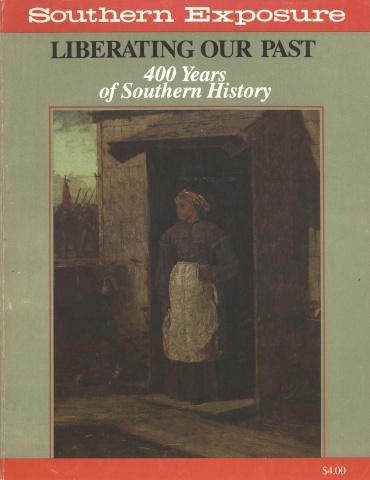Voices from the Past: The expulsion of the Jews from Thomasville, Georgia

This article originally appeared in Southern Exposure Vol. XII No. 6, "Liberating Our Past." Find more from that issue here.
On August 30, 1862, a group of frightened citizens met at the courthouse square in Thomasville, Georgia. They had gathered to take action against Jews living and peddling in the area, who they believed had “no abiding interest or fraternity with us . . . who are not identified, in the strictest sense, with the permanent interests of our soil and institutions. ” Convinced the Jews could not have any “feeling common with the Confederacy,” these citizens were ready to blame them for rising prices and a scarcity of commodities caused by a Union naval blockade and an inadequate industrial base. They resolved that itinerant Jewish peddlers and the three resident Jewish families were responsible for their economic plight. The citizens of Thomasville were determined to show no quarter to extortioners who would through “exorbitant and ruinous price” and without conscience reduce families to “intolerable want.” They passed a series of resolutions by which resident Jews were given 10 days notice of expulsion, Jewish peddlers were prohibited from entering Thomas County, and a Committee of Vigilance was appointed to enforce the resolutions.
The attack on the loyalty to the Confederacy of Jews struck a sensitive nerve among Jewish soldiers in various units stationed around Savannah. Their responses echoed a common theme among Jews in many countries: a desire to be full citizens of the nation in which they live, while maintaining their religion. Those in the Tatnall Guards wrote a fiery letter to the Savannah Republican:
The resolutions adopted by that meeting, couched as they are in the language of unqualified and indiscriminate proscription, and striking as they do at the honesty, integrity, and patriotism and loyalty of the community, betray in illiberality of sentiment, a hostility of feeling and bitterness of prejudice, strangely at variance with the precepts of religion, and which we had scarcely expected even from our worst revilers. . . . An urgent and imperative sense of duty to ourselves, and our own character as a constituent portion of a much injured and unjustly proscribed class, constrains us to enter . . . our earnest and indignant protest against this unfounded and unwarrantable attack upon the resident German Jews of the Confederacy. . . . Once sanction such a precedent as these Thomasville resolutions would introduce — establish the principle that an entire class in the community, however free the great majority of them may be from all complicity with the guilty few, must nevertheless by an arbitrary edict be compelled to share their ignominy — and you inaugurate a system of proscription and ostracism, from which humanity shrinks back with horror, and which would speedily tend to undermine and overthrow all the foundations of society. . . .
The Jews of the 32nd Regiment of Georgia Volunteers heard Private Charles Wessolowsky express similar sentiments, but he went further:
Let us look at the gentlemen from Thomasville who claim nativity to Thomas County, and are entitled to citizenship of their village, and see if they themselves don’t partake of this extortion. Behold them coming to market, the one with fowls and the other with eggs; ask their price, and “two dollars for a pair of chickens and 70 cents for a dozen eggs,” will be the reply. . . . What is the cause of those high prices? Is it the scarcity of the articles, originated by our blockaded ports? Does it take more labor, expense, and time now to raise those articles than usual? Or is it their zeal and patriotism towards their country in elevating the suffering of the sick and dying soldiers in hospitals? . . . Only the love for money, and the knowledge that necessity compels us to buy the same, is the sole cause of this extortion! . . . If you ask the gentlemen of Thomasville who are the extortioners, they will push the whole of the crime upon the German Jews and clear their own skirts by asserting their nativity.
Wessolowsky’s listeners then adopted a resolution he had helped draw up earlier:
Whereas, We have read with astonishment and surprise the proceedings of a meeting . . . wherein German Jews and foreigners were denounced in unmeasurable terms — the former accused of all faults and vices of human society, and the latter even held as unfit for train hands, etc., etc.: Be it therefore
Resolved, That we esteem the members of the meeting held on that day at Thomasville with contempt, and deem the motive of the same based only upon selfishness and envy.
Resolved, That we advise all German Jews and foreigners henceforth to cut off all communication and friendly ties between them, and be separated for the future, as we deem them unworthy of the same.
Resolved, That we regard the resolutions adopted at that meeting in Thomasville as unbecoming and unworthy of gentlemen.
And be it further resolved, That the Savannah Republican, and all other papers in our State which are opposed to such foul slander, be requested to publish the above.
This article is adapted from two articles by Louis Schmier: “Notes and Documents on the 1892 Expulsion of Jews from Thomasville, Georgia ” in American Jewish Archives, April 1980; and “An Act Unbecoming” in Civil War Times Illustrated, October 1984.